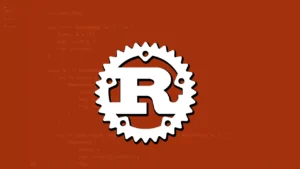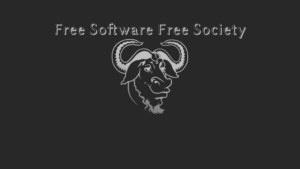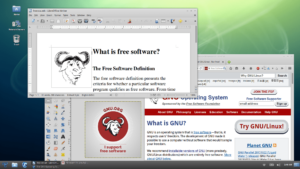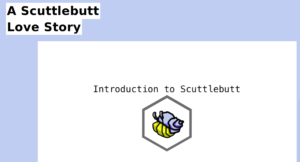We covered Linux-libre recently. If you use Linux-libre with Debian or its derivatives, chances are that you have come across jxself from jxself.org. Not sure about you guys but I have always been curious to talk to him every since I switched to GNU/Linux-libre a couple of years ago. Jxself is an Internet nick used by Mr Jason Self from Seattle, USA.
He is a free software and culture enthusiast as you already know. I have always been curious to talk to him since I learned about free software movement and got interested in free/libre software, free-as-in-freedom and not in price.
Last week, I had an idea of interviewing him and introducing him properly to our lovely audience i.e. you. So, I requested for an interview of him over freenode IRC network. He agreed for a correspondence interview via email. Our team at Nixfaq, put together 13 questions for him. On request of Mr Jason, this sole post at Nixfaq is licensed under a Creative Commons Attribution-ShareAlike 4.0 International License . It is a free culture license.
Following is the unedited, verbatim and exclusive interview with Mr Jason Self aka jxself online:
Before we start here is what jxself said about the interview questions:
Some of the responses would be quite extensive if I were to write up full responses, almost like a full article or blog post in their own right. I’m instead trying to keep my responses short and avoid doing that.
0. What led you to be a free software and culture activist? Tell us more about how you switched from non-free [Windows or macOS] to a fully free OS.
jxself: I was burned by proprietary software. See https://jxself.org/how-i-learned.shtml
You would be startled to know he also used Macs and switched to GNU/Linux fully in 2007 only.
1. Most people have a misconception that free software means that the software will be insecure given all details are available to the public. A lot of big companies also push the agenda that if is the proprietary, there are less chances of exploits being available in the open. What is the best way to explain to the common public that this is not the case?
jxself: I see this as an attempt at a scare tactic that proprietary software people use to change the topic away from the issues of ethics and rights and toward something else: “Oh, um, there will be, um, security problems.” Being proprietary does not mean that there are less chances of exploits being available in the open. May I just randomly point at Microsoft Windows? That shows that people will find problems regardless. At the same time it does not mean that free software has fewer exploits. In fact some people say that free software has more than our fair share of problems. I won’t agree or disagree on that topic because it misses the point. Those are technical matters that can be fixed regardless. Proprietary software has itself improved over the years too. Free software isn’t a technical issue of exploits or bugs or vulnerabilities or whatever else. The real issue is one of ethics, rights and control. You should be the one deciding what the various computers in your life do and do not do. No one deserves to be a servant to a master that decides for them. That necessitates the software be free software.
2. Free software are great educational tools because the user can learn about the internals while using them. However companies like Oracle, IBM, Microsoft, Google, etc. often push their adoption of non-free software in educational institutes too forcefully resulting in students becoming consumers of existing software rather than being a creator. What changes do you suggest in the current education system to remedy this issue?
jxself: This reminds me of a tactic used by tobacco companies to target young people and get them hooked early. In the case of public schools that are funded by taxes I think there is a good argument to make that the public’s money should not be used to buy proprietary software, to instead require that schools use only free software, and not prop up proprietary software companies with public money. I don’t know that there is sufficient support to do that for the whole planet, or even for a whole country, but we can start by having conversations not only with individual schools but also people in general. There is more information on such efforts at https://www.gnu.org/education/
3. There is a recent trend that many big organizations are abandoning self-hosting and going the SaaS route even though they have the resources to self-host. What do you think is driving this? Is the present worldwide education policy to blame? How do we remedy this?
jxself: The issues of self-hosting and SaaSS (Service as a Software Substitute) aren’t specific to organizations but people too. I think there are many different reasons why people do not self-host and why they might use SaaSS. One thing that can get in the way of an individual person hosting at home can be the ISP’s Terms of Service that forbid anyone from serving things from their home. I think Eben Moglen had a great response to that here; https://jxself.org/isp-tos.ogv but that is not the only issue that exists. This is a complex problem and, like many complex problems, requires a multi-pronged effort to address it. Eben Moglen also gave a great talk on this topic about why people should self-host and one possible way out: http://www.softwarefreedom.org/news/2010/feb/08/audio-and-video-eben-moglens-talk-freedom-cloud-no/ but it, too, is not necessarily the only option. I’d love to see more public discussion in this area both among ourselves about ways to escape and with the public at large to raise the issue.
4. According to you, how much is fair source license (fair.io) compatible with the definition of free software?
jxself: It is not at all compatible. The Use Limitation goes against Freedom 0, making the license non-free.
5. The FSF recommends a complete ban of DRM because it infringes upon the basic rights of content consumers. Whereas content creators and publishers are hell bent on promoting DRM to any extent possible to gain control. This is especially rampant in the video game industry. Is there a solution where the content creator and publisher is fairly compensated even in the absence of any DRM? If no, is there a feasible middle ground?
jxself: As mentioned in the beginning I’m trying to keep these responses short but calling people “creators” and “consumers” and etc. plays right into pro-copyright and pro-DRM (Digital Repression Management) propaganda so let’s not go there. Similar to #1 I see this also used as one way to refocus the issue away from ethics and rights and toward something else. Unlike #1 which tries to raise technical issues this tries to raise money as the issue, and it also misses the point just as much as the technical issue did. The rights of one group of people should not be elevated over another group’s. Creative works rightly belong to the people of the world once published. That does not have to be incompatible with money and there are plenty of ways to get money without going against people’s rights to further change and share things; you’re limited only by your imagination for such things.
6. Libre hardware and firmware adoption is mostly limited to hobbyists and enthusiasts. Chip makers do not reveal internals because they more or less claim that they spent a lot of time, effort and money to build the said hardware and firmware and it is only fair to monetize the IP by limiting access to reproduce and create derivatives. Is there a way to democratize and monetize the development of libre hardware and firmware and push for greater adoption that isn’t heavily dependent on donations and volunteer time?
jxself: The technology for free hardware doesn’t exist yet and use of the term is, in my view, premature. When someone can download a freely licensed design from the internet and “3D print” their own one-off copy of a complete system (with or without changes) in the freedom of their own bedroom then I would agree that the era of free hardware has finally arrived. I used quotes there for lack of a better term because it won’t really be 3D printing, or at least not in any way that we’d be able to recognize today. Such technology is still decades away and I would love to see people working on this matter to try to get us there. This sort of technology will also raise various political and other issues that will need to be addressed in time. As a side note this is yet another reason to be licensing today’s designs in a way that permit upgrading to future license versions (the whole “or (at your option) any later version” part) as one part of what will surely need to be a multi-pronged effort to address those future issues.
7. We have heard you run a public email service yourself. Is it open to general public? Would you like to tell us more about it?
jxself: It really should not be called a “public email service.” The server is really for me but I have let some friends use it. And then eventually friends of their friends. And eventually some others. I talk about a little bit about the history of the server in that “How I Learned About Free Software” article I linked to earlier. It’s not really open to the general public and perhaps I have let too many use it if it’s now appearing as a discussion point like this. This raises all of the issues of self-hosting and de-centralization that are included in this group of questions. I don’t want to be part of the problem of re-centralizing things but rather to see people run their own.
8. As you know, not everyone has the luxury to self-host things at home. Do you think renting a VPS from a trusted provider like Gandi and running linux-libre on it is not close enough?
jxself: I don’t know that self-hosting should be framed as a “luxury” and there’s a whole discussion that could happen there but as I said I’m trying not to write entire blog posts for each of these questions. This seems a compromise to me. If anyone’s going to make a compromise it should come with a specific and actionable plan for how to address that compromise and get to the ideal state of self-hosting. An example could be various independent and autonomous groups of people getting together and doing their own stuff amongst themselves for their friends that are unable to for some reason or other. The smaller and more decentralized those groups are the better.
9. What are your views on life cycle accessment (LCA) and planned or programmed obsolescence by OEMs and tech giants?
jxself: Things like planned or programmed obsolescence are only possible with proprietary software. In the free world any sufficiently interested person, or group of people, could take on maintenance of the software.
10. What kind of smart-phone do you use as your main daily driver?
jxself: This is not smart at all: https://en.wikipedia.org/wiki/Push-button_telephone#/media/File:AT&T_push_button_telephone_western_electric_model_2500_dmg_black.jpg
11. What are your thoughts on google-free Android based ROMs like grapheneOS or /e/OS? What are your thoughts degooglisation in general?
jxself: It seems a net positive in one aspect of escaping Google’s surveillance, which is a different but overlapping issue from what free software raises of ethics and rights. Even if a net positive I fear that they focus solely on that one thing as being the end goal and not on moving the situation forward to have more devices that run free software all the way from the top to the bottom (i.e., replacing the lower levels of proprietary software with free software or developing new devices that can be used without proprietary software. We have a number of options where there is free software at the upper levels but the situation down lower is much more dire. I’d like to see people focus on that, since we really already have the upper levels taken care of several times over now.
12. You claim to be an ordained minister in the Church of the Flying Spaghetti Monster. What is the story behind it? Can you tell us more about it?
jxself: My point is: Don’t take religion too seriously.









